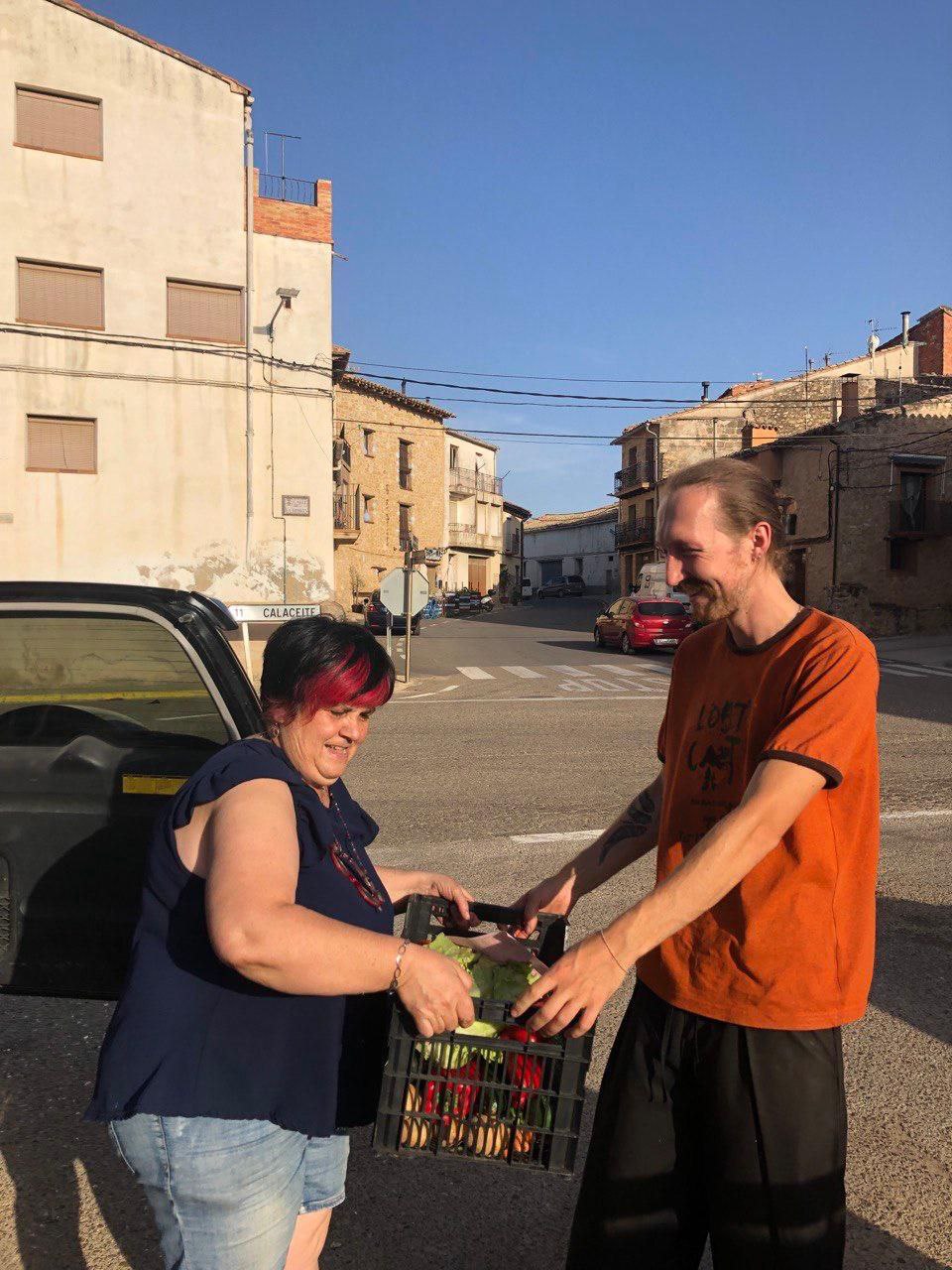
Boodaville & Sunseed Desert Technology – our 2023 volunteer Klif
During my stay at Boodaville, I have been thinking about group organization. In this post, I will give you some of the thoughts I’ve been having regarding the subject! These are based on the organizing we have been doing as our own project, as well as my exchange with Sunseed Desert Technology.
At the core of what we have been doing regarding organization is making sure all members of our groups feel equal, with equal opportunities, equal rights, and equal responsibilities within the group structure. We’ve been experimenting with our own form of sociocracy, which, for us, means decision-making by means of sociocratic meetings and proposals. I will start by explaining what a sociocratic proposal means, since how proposals work differs little between Boodaville and Sunseed.
A proposal is a statement and, most of the time, a proposed plan of action. It can be very detailed, a general statement, or everything in between. I think the best way to get the idea of a proposal across is to explain how it is voted upon. Everyone in the group votes on a new proposal. They will either consent to the proposal or object to the proposal. Another voting option is to consent with concern; these concerns will be taken into account during the evaluation of the proposal later down the line.
Consider this about this way of voting:
In order to vote correctly, it is important for everyone to understand the contents of the proposal. This is why proposals tend to be as simple as possible. The participants of the group have the responsibility to be informed, and the formulator of the proposal has the responsibility to inform.
Objecting is seen as a serious obstruction of the group process. The assumption is that the formulator of the proposal has taken the necessary steps to make their proposal as valid as possible. This process takes time and effort, which needs to be respected. If someone objects, that also needs to be respected. However, in sociocracy, you can’t just say, “Nah, I don’t like it” and be done with it. If you decide to block a proposal, it becomes your responsibility to take part in the process of making the proposal acceptable to you.
The point of the consent with concern option, then, is to give everyone a voice while at the same time promoting “things happening.” To keep this method effective, it is very important to have an effective, consistent evaluation. Only then will people be comfortable with allowing a not-perfect proposal to go into effect.
Between Boodaville and Sunseed, there is a consistency in how proposals come to be:
Step 1: Someone gets an idea for a proposal.
Step 2: The formulator(s) shapes the proposal
Step 3: The finished proposal is brought to the circle.
Step 4: The proposal is discussed, maybe even modified on the spot.
Step 5: The proposal is voted upon.
There is, however, a difference between the two projects.
At Boodaville, we are with a smaller group. It is easier for us to discuss proposals with everyone during work or downtime. The shaping of the proposal is an interactive process between all group members, organized by the formulator(s). This way, when proposals are brought to the meeting, everyone is already informed and has had the chance to give their input. We have to spend little time on the details of a proposal. To be fair, our group is so small that often times we don’t even formally vote on proposals. We are small enough to keep the proposals as ongoing conversations instead of black-on-white agreements. If proposals have a 100% chance to pass, why would you even vote on them?
Sunseed does not have that luxury! They are structured in departments (groups), whereas Boodaville is structured in managers (individuals). They also make a distinction between long-term and short-term volunteers. In general, there is a lot more going on than in Boodaville, and it is unrealistic to require everyone to be interested in every proposal. In Sunseed, when the finished proposal is brought to the circle, people need to be informed and inform themselves then and there—to a certain degree. This takes time. Sociocratic meetings ask a lot of all participants; they ask them to care.
In Boodaville, this effort can be spread out during the week, people are able to sleep on it more, and, maybe most importantly, the meeting does not get bogged down by long questioning. The real question here is: is being bogged down by long questioning necessarily a bad thing? What are you willing to give up for efficiency?
To illustrate, I’ll use the “meta volunteer” role they use in Sunseed. This is a person who gives feedback about the meeting. Would you want the meta volunteer to be active or passive? The meta volunteer could be someone who gives active feedback during the meeting: “Hey, you are speaking before your turn; please wait until the facillitator picks you” or “Hey facillitator! That person has been waiting for their turn!” The big pro is that the meeting gets more efficient. The con would be that… the meeting gets more efficient?!
In sociocracy, the point is to get everyone involved and to make the decision process a community, and therefore human, process.
In Sunseed, the meta volunteer has a passive role, only giving their feedback after the meeting has ended. The active feedback role is part of the facilitator’s tasks, alongside introducing new topics and giving people the chance to speak. You could interpret this as giving as few people as possible as few “leadership rights” as possible to respect the core of sociocracy. You could also interpret this as a way to minimize interference with the ongoing conversation and to respect the fact that inefficient—but human—conversations can lead to new and fruitful perspectives.
Another interesting thing—to me at least, haha—about the meetings in Sunseed is that they have the option to add new things to the original proposal. From the perspective of a “regular/corporate” meeting facilitator, adding this option is awful! Everyone, from people very invested in the topic to people who just got informed five minutes ago, is able to share their smallest thoughts and ideas, no matter how irrelevant or misplaced they may be! But the cost in time and attention span might be worth the yield of inclusivity and new perspectives.
Sunseed also makes use of “tronki meetings.” These are only for department coordinators and people with a commitment of 6 months or more. While I have not attended one, I can take a guess as to what things they would discuss there—things that are not particularly our business! Recurring events, administrative and technical mumbo-jumbo, stuff regarding short-term volunteers, etcetera. Undoubtedly, these meetings are partly there to relieve the general meeting, where a group of “more invested” and, over time, more knowledgeable people can get some real stuff done. However…
Experts—people with more knowledge of and time invested in a certain topic—are very strange. They are often the people most informed and the most “in tune” to make decisions on certain topics. But they can also get stuck in a certain direction and not want anyone else to make these decisions for them, creating tension with the rest of the group. While tronkis are not experts per se, they do represent a distinction between otherwise as equal as possible people.
The tronki meetings in Sunseed resemble a possible solution. You can view it as another sociocratic circle, “subordinate”1 to the general circle. This time, for efficiency’s sake, they chose to give up inclusivity and new perspectives for efficiency. However, the tronki meeting still reports to the general circle; there is a place for questions and scrutiny by the entire group. And the group can decide whether the “experts” (or “leaders” or “distinct group with certain functions”) are still in line with the entire organization.
Imagine a tronki meeting in the corporate world; only then would it be called a “board meeting.” While not directly comparable, they share some overlapping responsibilities, like those having to do with “long-term strategy.” Corporately speaking, this “circle” would be placed on top. Companies and all groups throughout history have valued and rewarded certain qualities and services in individuals more than others. Sociocracy reminds us that we are not great because of ourselves, but because of our system; it’s a “could the inventor of the cart have been so brilliant without the inventor of the wheel”-type situation. In a sociocratic company, there would be no stereotypical top-down decision-making. Instead, you’d have the “strategic management” circle, the “production” circle, the “public relations” circle, etc., and a general circle, where everyone (through (online) mass gatherings, or by sending delegates from each circle, or whatever means) will decide about relevant things for them personally (pay, work hours, festivities) and consent to relevant things for the company (ethics, products, public image). Managers might still earn more than factory workers to allow more compensation for an arguably more stressful job, but it would be with the consent of said factory workers.
Sociocracy is a way of organizing that accepts human flaws and tries to make things happen in spite of them. We’re not perfect, and we’ll never be, but together we can filter out our individual faults and quirks and create a functional whole. It’s strength is abundance thinking. Is there a problem? Let’s take time to create a solution. There is nothing we can’t fix together; if you give someone real responsibility, they’ll take it. It is also its pitfall. Never has there been a quiet moment, and especially our age asks for a lot of responsiveness and decisiveness, which sociocracy cannot provide in a timely manner. Sometimes, scientifically, even an authoritarian leader is what the situation calls for. But to me, sociocracy feels like starting the labyrinth of human organization at the exit and working your way back to the start. Successful sociocracy is a very compelling ideal, a daunting undertaking, but something worth striving for in these polarizing times.
___________________________________________________________________________
1 I use the word “subordinate” here to illustrate the responsibility towards the group as a whole. In practice, the general circle is made up of all sorts of subordinate circles, like the departments; it is a way to ensure horizontality between all “subordinate” circles.

